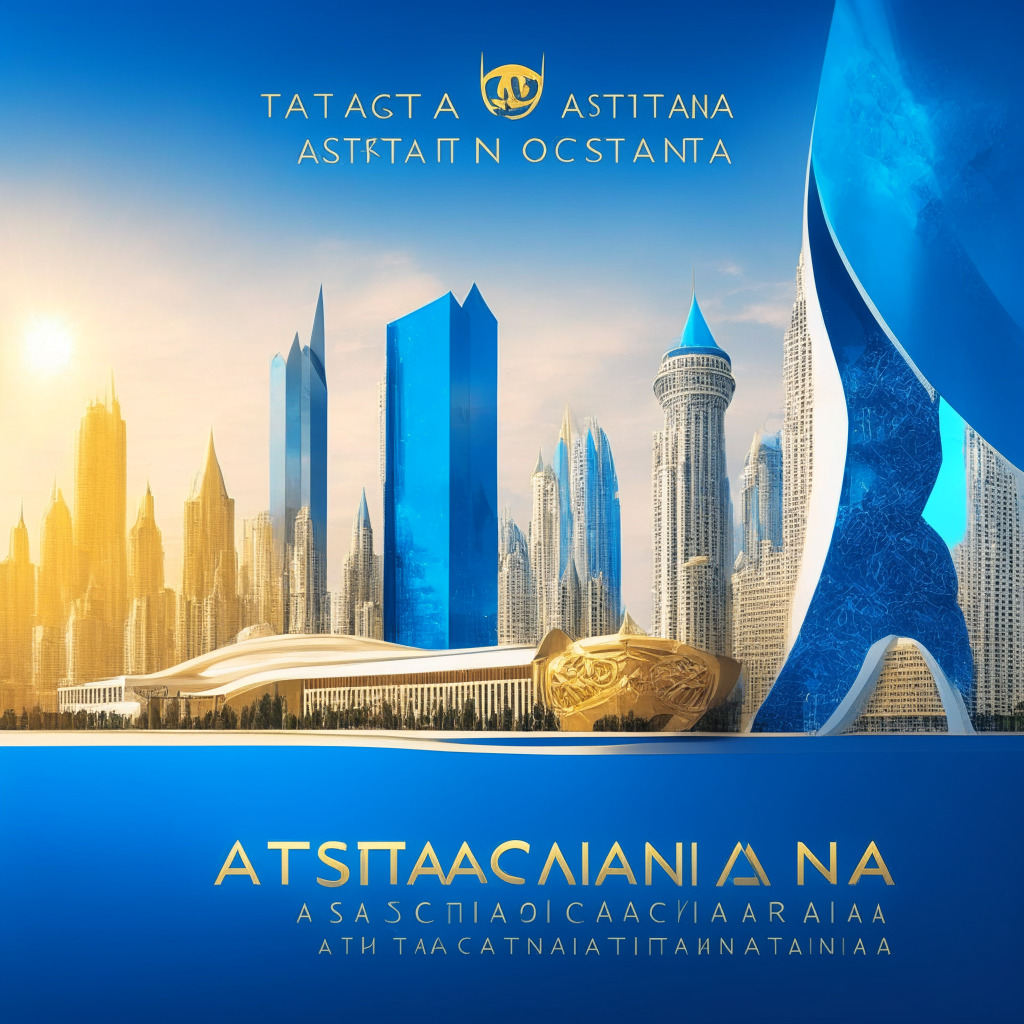A historical milestone was achieved in the UK, with a bill overseeing cryptocurrencies and stablecoins passing into law. This legislation, receiving Royal assent, brings crypto assets under increased regulatory scrutiny, intending to safely integrate them into the UK’s financial landscape. This includes treating crypto as a controlled activity and monitoring promotions.
Search Results for: ZA Bank
Unleashing Blockchain’s Potential: Tokenization Revolution Amidst Digital Asset Landscape Tensi
“Tokenization, an application of blockchain that turns real-world assets into blockchain-based tokens, could revolutionize infrastructures and markets in the next decade according to Bank of America. However, they also anticipate the disappearance of 99% of current tokens due to inherent risks.”
The BlockFi Debacle: Bankruptcy Resolution or Complete Liquidation – Which Path Leads to Better Recovery?
“Creditor committee alleges defunct crypto lender BlockFi’s management of fraud and delay tactics amid bankruptcy proceedings. BlockFi’s recent filing suggests a potential 39%-100% recovery for account holders. Still, the question arises whether liquidating the company is the best course for the creditors.”
Public vs Private Blockchains: Leveraging Permissioned Systems for Secure Asset Tokenization
The potential of blockchain technology in improving settlement through asset tokenization is acknowledged, but skepticism arises about the viability of public blockchains. The solution lies in public permissioned blockchains, which provide security, scalability, transparency, and regulatory compliance while preserving decentralization. These blockchains are beneficial for financial markets and decentralized finance (DeFi) onboarding with the right infrastructure.
Sudden Banking Cutoff Stuns Binance Australia: Effects on 1 Million Users and Crypto Industry
In May, Binance Australia faced a sudden suspension from the country’s banking system, impacting around 1 million customers. The banking changes also affected the larger Australian crypto industry, emphasizing the urgent need for sensible regulation, licensing, and growth-friendly environments in the crypto space.
AI and Crypto Synergy: Unlocking Transparency, Decentralization, and User Control
The integration of AI and crypto has the potential to revolutionize both industries, fostering greater transparency, user control, and decentralization. Industry insiders suggest that AI could open up new opportunities for the blockchain sector, driving its resurgence and bringing additional real-world use cases.
The Future of Tokenization: CBDCs, Decentralization, and Global Monetary Landscape
The IMF and BIS published reports discussing the future of the monetary system and the potential impact of crypto and central bank digital currencies (CBDCs) on tokenization. Tokenization represents claims digitally on a programmable platform, integrating records of underlying assets with their transfer rules and logic. The reports emphasize tokenized CBDCs’ role in maintaining settlement stability and “singleness of money.”
FTX Bankruptcy: Media Outlets Vs. Privacy – Clashing in the Quest for Transparency
Four prominent media outlets appeal against a bankruptcy judge’s decision to permanently redact FTX crypto exchange customers’ names, citing the need for transparency. FTX argues that revealing names could expose clients to identity theft and scams, affecting the success of bankruptcy reorganization.
Debate Over FTX Customer Privacy: Balancing Crypto Risks and Bankruptcy Disclosures
This article discusses the debate surrounding FTX’s decision to protect customer names from bankruptcy disclosure requirements due to their use of cryptocurrency. The outcome may set significant precedents for future bankruptcy cases involving cryptocurrencies, focusing on balancing customer privacy and legal obligations.
Tokenization Revolution: Unleashing Potential and Overcoming Challenges in the Digital Age
At the World Token Summit, experts discussed tokenization’s potential to revolutionize industries through benefits like asset fragmentation and digital identities. Despite challenges in technology and KYC processes, advancements in forensic analysis and embedded identity solutions may boost tokenization adoption and transform various sectors, including real estate.
Binance’s Kazakhstan Launch: Embracing Regulation or Escaping Scrutiny?
Binance has launched a regulated cryptocurrency exchange in Kazakhstan, offering users various crypto and fiat-focused services. Amid growing regulatory troubles for Binance in the West, this move raises questions about whether established crypto players will continue seeking crypto-friendly jurisdictions or if regulatory bodies will adapt to accommodate the rapidly evolving industry.
SoftBank CEO’s Emotional AI Connection: Examining ChatGPT’s Impact on Decision-Making & the Future
SoftBank CEO Masayoshi Son shares his emotional connection to ChatGPT, an AI chatbot developed by OpenAI. He envisions a future where technology can mitigate societal ills, such as natural disasters. However, skepticism remains regarding potential risks and downsides of AI dependence, including job displacement and the power dynamics between humans and AI.
CACEIS Registers as Digital Asset Provider: Balancing Decentralization and Regulation in France
Credit Agricole’s CACEIS, a joint venture with Santander, recently registered as a digital asset services provider in France. The European Union has adopted the Markets in Crypto Assets (MiCA) framework, aiming to establish comprehensive regulations for cryptocurrencies in Europe, implementing environmental safeguards, supervisory provisions, and consumer protections. French market demonstrates openness to digital assets while balancing decentralization with stricter licensing requirements.
Major Financial Firms Enter Crypto Market: Boon or Bane for Decentralization and Innovation?
The crypto market experiences a long-term ripple effect as major financial firms like BlackRock, Invesco, Fidelity Investments, WisdomTree, and Valkyrie Funds enter the digital assets market. Skeptics worry their involvement could increase regulation, potentially hindering innovation and the decentralized spirit valued in the crypto community.
Binance Launches Regulated Platform in Kazakhstan Amid Western Regulatory Woes
Binance launches a regulated digital asset platform in Kazakhstan amid regulatory troubles in the West. The platform offers crypto and fiat-focused services and aims to mitigate regulatory risks facing the exchange in the United States and Europe.
Bankruptcy and Revival: Core Scientific’s Path to Restructuring and Crypto Industry Impact
Bitcoin miner Core Scientific has filed its bankruptcy plan, focusing on revamping its business model after experiencing a boost in liquidity. The company attributes its improved performance to higher bitcoin prices, increased network hash rate, and reduced energy costs. The Chapter 11 bankruptcy plan serves as a vital tool in restructuring the company’s operations.
Binance CEO Backs New Exchange EDX: Boon or Threat to Crypto Decentralization?
Binance CEO CZ supports new cryptocurrency exchange EDX, backed by prominent financial institutions like Citadel Securities, Fidelity Investments, and Charles Schwab. EDX plans to initially offer trading in Bitcoin, Ethereum, Litecoin, and Bitcoin Cash, while aiming to launch a clearinghouse later this year.
Regulatory Debates Shape Crypto’s Future: Institutional Adoption and Tokenization at Stake
A recent survey by crypto company Laser Digital revealed that 82% of respondents hold a positive view of the digital asset class, with optimism for Bitcoin and Ether performance. However, 90% prefer investment vehicles backed by large traditional financial institutions, highlighting the need for increased regulatory clarity and market experimentation for digital assets and traditional finance to coexist and benefit investors.
The Decentralization Spectrum: Pursuing the Ideal in the Web3 Era and Its Challenges
Decentralization in the crypto world often falls into a gray area, as it is a spectrum rather than a binary feature. Projects should strive for greater decentralization by improving process efficiency, eliminating intermediaries, utilizing decentralized storage providers, and prioritizing community involvement. Embracing decentralization as a spectrum can drive progress within the blockchain sphere.
Exploring the $5 Trillion Tokenization Opportunity: Benefits, Challenges, and Key Players
Tokenization is predicted to reach a massive $5 trillion opportunity over the next five years, with leading forces including stablecoins, CBDCs, private market funds, securities, and real estate. However, regulatory challenges and market volatility could significantly impact its realization.
Tokenization: Unlocking a $5 Trillion Market or Stumbling on Regulatory Uncertainty?
Tokenization, the process of converting real-world assets into blockchain-based tokens, offers opportunities such as operational efficiencies, improved liquidity, and market accessibility. However, regulatory uncertainty remains a significant challenge as the approach of policymakers will influence the future success of this growing market.
Crypto Controversy: Bankman-Fried, FTX, and the $3M DC Property Mystery
A Washington D.C. townhouse previously linked to defunct crypto exchange FTX and its former CEO, Sam Bankman-Fried, may soon change ownership. This comes amid heightened skepticism towards crypto exchanges, increased regulatory scrutiny, and concerns regarding user fund protection following FTX’s collapse.
South Korea’s STO Market Boom: What Lies Ahead for Banks and Investors by 2030
South Korea’s security token offerings (STO) market could reach $287 billion by 2030, with major banks preparing to enter this growing market. Recent government policy announcements regarding STO regulations have prompted a positive response from the banking sector, resulting in rapid market growth and the formation of an STO alliance among major banks.
Tokenization’s Future: Balancing Decentralization, Security, and Scale in Finance
Michael Hsu, acting head of the U.S. OCC, acknowledges tokenization’s potential in transforming finance but expresses concerns over decentralized blockchains. He suggests that centrally operated, trusted blockchains can achieve security and scalability, emphasizing the importance of a legal framework to support tokenization and interoperability with existing financial systems.
Celsius Bankruptcy Plan: Converting Altcoins and Legal Concerns for Borrowers
Crypto lender Celsius proposes a reorganization plan to convert customer altcoins into Bitcoin and Ether, addressing regulatory concerns and maximizing asset value. However, borrowers may object to repayment demands without collateral return, potentially impacting industry regulations and customer trust.
Colombia’s Central Bank and Ripple Explore Blockchain Benefits: Pros, Cons and Conflicts
Colombia’s central bank, Banco de la República, partners with Ripple and MinTIC in a blockchain experimentation phase aimed at enhancing the national high-value payments system. Despite potential benefits, concerns about overdependence and centralization of power remain.
South Korean Banks Join STO Consortium: Exploring the Tokenized Securities Ecosystem
Major South Korean lenders such as Hana Bank, Shinhan Bank, and Woori Bank have joined a bank consortium focused on security token offerings (STOs) established by Seoul-based NongHyup. The consortium aims to create a tokenized securities ecosystem, where primarily companies can issue tradable corporate bonds as security tokens while addressing regulatory challenges. South Korea’s STO market is projected to reach 34 trillion won ($26.6 billion) by 2024, signifying the nation’s commitment to a digital future.
Solana Hard Fork Debate: SEC Pressure, Decentralization, and Developer Stance Unraveled
Last week, the SEC labeled Solana’s SOL token as a security, leading to intense debate on Crypto Twitter about a potential hard fork. Despite concerns over regulatory clampdowns and the protocol’s relationship with the now-defunct crypto exchange FTX, developers and the Solana Foundation have not seriously considered the fork.
Genesis Bankruptcy Battle: Crypto Lenders, Exchanges, and Creditors Fight for Share
Cryptocurrency lender Genesis faces continued bankruptcy threats as mediated talks with creditors, including parent company DCG, progress. The updated reorganization plan indicates some agreements on key issues, but disputes and negotiations among stakeholders persist, involving companies like DCG, Three Arrows Capital, FTX, and Alameda Research.
Banks and Chainlink Team Up for Blockchain Interoperability: Possibilities and Security Risks
World’s largest banks, including Citi and BNP Paribas, are testing permissioned bank-owned blockchains under SWIFT’s guidance to enable communication with public blockchains like Ethereum. Chainlink’s technology will serve as the bridge, overcoming network fragmentation and ensuring secure information sharing across public and private chains.
Bank of Thailand’s Retail CBDC Pilot: Exploring Potential, Tackling Challenges, and Shaping the Future
The Bank of Thailand has launched a retail central bank digital currency (CBDC) pilot project in collaboration with local banks and a Singapore-based payment service provider, highlighting the country’s commitment to exploring new technologies. The main challenge lies in distinguishing CBDCs from existing payment platforms like PromptPay.
Bank of China’s First Tokenized Securities: Hong Kong’s Growing Crypto Hub Status & Challenges
The Bank of China’s investment banking arm, BOCI, has issued tokenized securities on Ethereum in Hong Kong, a first for a Chinese financial institution. This move signifies increased crypto adoption, supports Hong Kong’s ambition to become a key crypto hub, and highlights the need for addressing regulatory and safety challenges.































